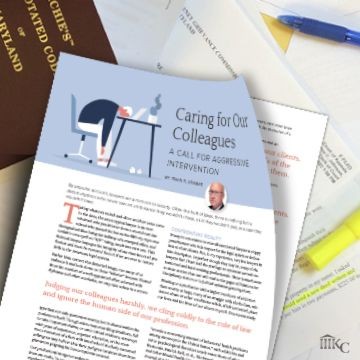The Lawyer's Lawyer
Caring for Our Colleagues
Q. In a profession with a higher incidence of mental illness and addiction than society at large, are we doing enough to care for our colleagues?
A. Like lawyers themselves, our profession places a low priority on wellness and mental health in general.
In a field where the "client comes first," many of us frown upon the concept of "work-life balance." Rewarded for the number of hours we spend at the office, attorneys often take professional pride in sacrificing their personal lives to champion the rights of others. Rather than concede "weakness" by asking for help, we project ourselves as pillars of strength, maintaining a professional façade even as life crumbles beneath us.
We may "love the law," but does the law love us back? Most states budget millions per year to prosecute lawyers, but little, if anything, on alternatives to discipline that may save lawyers in crisis. Rather than look out for one another, we are told to report on each other. While some offenses may require a report to "the appropriate professional authority," our Rules of Professional Conduct say nothing of our need to refer colleagues for appropriate professional help.
If we really care about our clients, we must take better care of the professionals sworn to serve them. In my own state, where their prosecutor has the sole power to approve ad hoc "diversion agreements," I have proposed a more structured program composed of:
➤ Remedial Education – practical courses and hands-on instruction covering problems which may prompt discipline, and teaching lessons that reprimands and other sanctions cannot;
➤ Addiction and Crisis Intervention – as part of a comprehensive diversion program, existing Lawyer Assistance Programs can reach more lawyers, save more lives and provide key strategies for coping with the pressures of a stressful occupation;
➤ Mentorship – a volunteer network of attorneys and accountants to mentor and to monitor lawyers on practice management, retainers, billing, trust account management and other practical tasks; and
➤ Community Service – a pro bono component letting lawyers "work off " potential sanctions and further enhance the public's access to justice.
As the article below indicates, I believe that a more organized approach to intervention can improve the quality of law practice by improving the quality of life for those who practice law:
